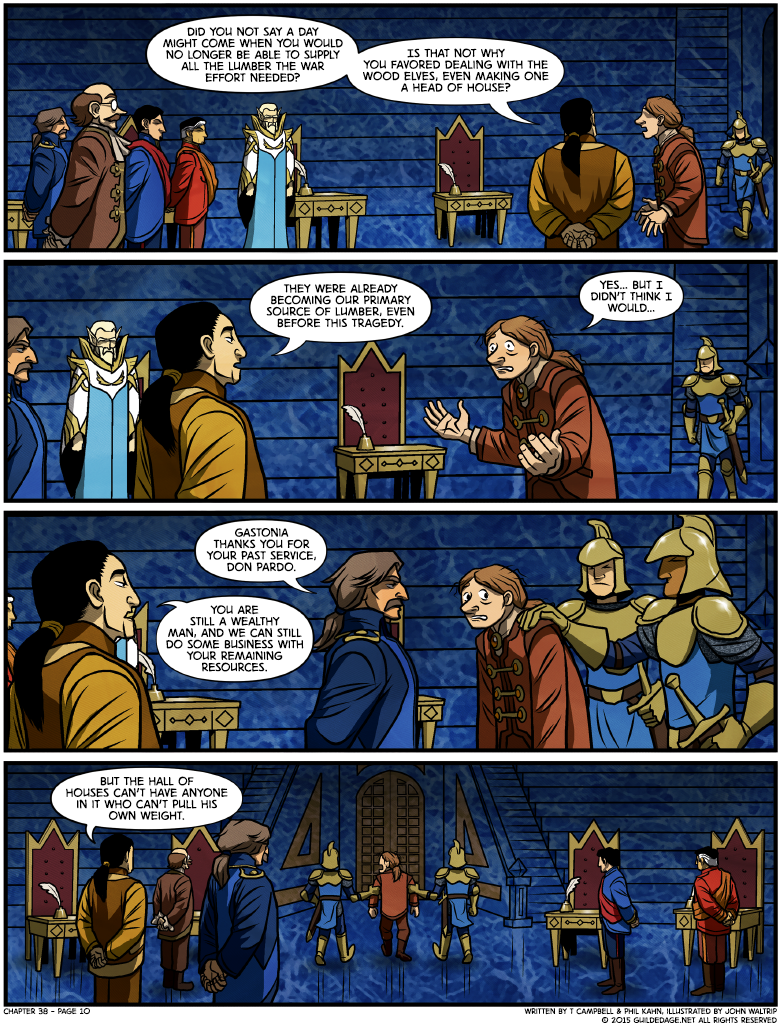Annotated 38-10
 Apart from a brief flashback, this is it for Pardo’s appearances in Guilded Age. Flo deserves credit for the deep irony here, that Pardo was the one who instigated this “altruist conspiracy” and has now, like Robespierre, become its victim as it’s grown beyond him.
Apart from a brief flashback, this is it for Pardo’s appearances in Guilded Age. Flo deserves credit for the deep irony here, that Pardo was the one who instigated this “altruist conspiracy” and has now, like Robespierre, become its victim as it’s grown beyond him.
In a very broad sense, this will turn out to be mercy for Pardo. Because it means he won’t be in danger when the Hall of Houses and Gastonia itself collapse. Reader kammon asked what Pardo might be up to in a post-Gastonian society, and what I said then still seems right to me:
Pardo is, I think, still confused and disoriented. He doesn’t seem to have much of a hateful streak, but a lot has happened that he’d find deeply upsetting.
He, like many people on both sides of the conflict, assumed that the Rebel defeat of Gastonia would result in human genocide. And now it…didn’t? In the once-Gastonian streets, various races are mingling more or less peaceably. But there’s still enough low-key conflict that humans fear their purge may just arrive a little later.
Most of them take solace in Byron’s reassuring presence, but to Pardo, Byron is a man who spectacularly failed to protect his friends and family. He misses his old friends in the Heads of Houses–-but they were never really his friends, were they? And he narrowly missed imprisonment/execution specifically BECAUSE they weren’t his friends and ousted him before they lost the war.
I don’t know whether he’d get over all that, eventually. If he did, his congeniality would make him the sort Penk wanted looking after human affairs, so he may well have a place in the current government. But like Rana, if he did recover, it wouldn’t be in time for [the series] finale.











That sounds about right to me. Pardo would eventually get over it, and come to be part of the solution, but it would take a while.
…or he’d become a _very_ bitter old man and do some very unhelpful things…
Or, his capacity for adaptation spent, he’d just go on to a rather confused and reclusive retirement.
No more fucks to give, no spoons with which to cope.
I think that a good while after the end, Syr’nj would likely remember that Pardo was not entirely an asshole and probably would take the initiative to check on him. She would be a welcome buffer between him and the failure of his expectations vs reality.
So … Pardo needs to go because his town isn’t really supplying the lumber anymore, and therefore they don’t need him. But then why the guards, why treat him like a traitor rather than just get him to agree that he no longer has too much to offer, thank him for his unwavering service, give him a nice box of chocolates and wish him a nice day? Wouldn’t that method of dismissing sitting members of the house generally reduce the likelihood of adverse reactions? Why would anyone consider it necessary to make sure they hate everyone else?
Seriously, the behaviour of these people makes no sense to me.
…that is to say: it rings absolutely true to what I can observer in real-life politics, but that doesn’t mean it makes a shred of sense to me.
I’ve never worked at a company that was as amoral as the Altruists were. (The auto auction may’ve come close toward the end.) But even at the companies I worked, they generally handled dismissals in a way that the dismissed parties weren’t given the option to cry, beg, or cling to anybody’s leg on their way out the door. After the way Annunziata reacted to his expulsion, I’m not surprised the Altruists started streamlining the process to minimize in-Hall drama.
(Which is to say, I don’t think it can be assumed that Pardo would meekly accept his termination.)
And just to be clear, the guards are just there to escort Pardo firmly out before he can make a scene. Jarvis wouldn’t be saying “We can still do business” if Pardo was being sent to jail.
That said, there are important aspects of this dismissal that have gone unsaid. Pardo has lost his lumber, and therefore his power, specifically because Iwatani planned it that way. And the Five Heads of House present are all fairly ruthless and amoral. The Heads they are eliminating are the ones who are not. If they were really as friendly with each other as they’ve sometimes pretended to be, then they probably would handle the expulsion of members a bit less bluntly.
1. Did not realize Jarvis is speaking that line. The angle of the shot in the panel makes it seem like Iwatani is.
2. Caneghem is ruthless and amoral? Is there evidence for that in the comic?
Whoops, you’re right on point 1. That’s Iwatani’s line. But it barely matters because they’re pretty much all speaking with one voice at the moment.
Caneghem is the least amoral and ruthless of those who remain but aside from his fellow-feeling for Reynolds, he cares only about the interests of his people, which he defines as those of his people’s conservatives. He would quite calmly kill the Peacemakers or let every human in Arkerra spontaneously combust if he felt that doing so would advance those interests.
Caneghem knows better, yet still goes along with this whole thing.
And when it blows up, rather than try to help pick up the pieces, he chooses for his flying kleptocracy (summoning is theft, after all) to go into total isolationism.
I’d say he’s the most amoral of the group.
The other “altruists” are immoral, breaking rules they do to some extent understand… but it doesn’t seem like Caneghem sees the other species as moral subjects at all, so he does not care what happens to them.
And yet, he was nice enough to explain the ruthlessness of the whole assembly to Reynolds.
My take is that he’s clocked what’s going on, decided he’s prepared to play the game, but his sense of fairness still prevents him from pretending in front of anyone else that it was any other kind of game than the one it is. Which gets him a kind of respect from me which the other heads (bar Syr’Nj) don’t get. They either consciously pretend or otherwise delude themselves that they’re doing something good.
*”…that the house is jointly trying to do something good”
Yep, this. I always assumed that Caneghem was rational and calculating enough to know that, whatever his people needed from Gastonia (trade?), participation in this conspiracy was part of the deal. “Flying kleptocracy” is an excellent point, but otherwise Caneghem shows no sign of plotting or villainy.
Caneghem is not a good guy, though.
He’s a tall, old gandalfy white guy, but he’s only there to preserve the privilege of his own people, at any cost.
He might have some small sympathy for the gnomes, but it doesn’t stretch far enough to amount to anything.
What, apart from his appearance, a goodness stereotype, is actually good about him?
Seems to me, other peoples are just insects to him.
I find that mode of dismissal absolutely disgusting.
I can’t help but think of that scene from The Ffuneral, where Christopher Walken’s character, as an 8-year-old, is handed a gun by his father, who tells him they’ve got this guy in the basement who they thought did something really bad, but it turns out that actually he didn’t do anything and had been exactly the good friend he said he’d been. But now they’ve beaten him up and everything, so he’s probably not a good friend anymore, which means they can’t just pat him on the shoulder and let him go …
And that’s how little Christopher learned an important life lesson.
To me, escorting someone off the premises is the most antagonizing way to let someone go, and the best way to make enemies. Call them at home and tell them via phone if you’re afraid of retaliation. But actually, unless you think someone’s been stealing from the company or something, you should be able to trust them not to do anything stupid on their way out. Whoever has no problem terminating someone on the spot should also have the patience to hear what the other person has to say about it.
In the last place where I didn’t quit, I was simply told that my contract was not going to be extended, 2 months in advance. I kept working for those two months, got a small (if slightly awkward) farewell party and some (slightly off-the-mark) presents, and a friendly handshake. As far as I can tell, that was the usual way how people left (I’d attended a few such events myself). The only explanation I can think of for having people escorted off the premises is psychopathic/sadistic managers. Any employee who takes pride in their work will want to leave their stuff in order and hand their projects over to someone else. Denying them that (even though they still need to be paid for the remainder of their notice period) is just adding insult to injury.
It’s not “sorry, we can’t pay you anymore”, it’s “we suspect you may not be happy with this decision, therefore we’re going to treat you like an enemy”. It’s “yesterday we were friends, but we just decided it makes more financial sense to let two months’ wages go to waste and tank throw away all your half-finished work, just to make you miserable.” Oh, the impotent rage! I can’t even begin to explain how kafkaesque this stuff feels to me…